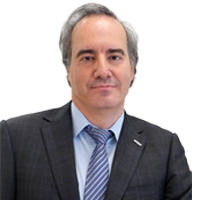
Jaime Corderas | President of Ecotic
“In a context of change and transformation, not exempt from uncertainties and complexities, the role played by the Producer Responsibility Organisations (PROs) is fundamental in achieving the transition to a circular economy model”
This is the first opportunity I have to address all of you as the new president of the Ecotic Foundation. A position where I take over from Javier Cervera, who for the last two years has been the maximum representative of the organisation’s Board of Trustees. His long history in the electrical appliances sector and his commitment to environmental sustainability have provided enormous added value to the consolidation of Ecotic’s growth over the years. On behalf of the entire Board of Trustees and the Foundation’s team, I would like to thank you for your dedication to the project.
I take over the presidency on the occasion of the 15th anniversary, when an all-time record in collection has been reached in management results, exceeding the forecasts for the year. However, the crisis caused by COVID-19 poses an unexpected and complex scenario that will demand a review of many aspects in order to ensure the continuity of the household appliance industry, one of the great economic driving forces in Europe.
We must, therefore, pay attention to the implementation of the Waste Framework Directive, which will introduce modifications to the current Law 22/2011 on waste and contaminated soil, and which, together with the modification of the Royal Decree 110/2015 on WEEE (RD 110/2015), will lead to an update of the legal regime for the production and management of waste, establishing the obligations of producers and managers.
Therefore, it will be necessary to analyse the evolution of the general minimum requirements of Extended Producer Responsibility (EPR). It is precisely the producers who must provide financial and organisational measures that must be modulated according to the typologies of products and develop the concept of ‘ecomodulation’, which seeks to reward efforts in the design of products that contribute to preserving the environment and the circular economy.
In keeping with this development, and despite current difficulties, the industry must continue to promote innovation and to incorporate ecodesign as an essential element. To innovate by developing measures aimed at facilitating repair and recycling, minimizing the use of resources, maintaining the use of products for as long as possible, and reintroducing waste as a secondary material into the production model are all examples of such measures.
However, this effort will not be successful if it is not supported by public policies that are in line with these developments and responsive to market dynamics. The debate on the management model and the establishment of realistic collection targets adapted to the specificity of the equipment is a central aspect for the present and future development of the sector.
It will also be essential to continue forging alliances with distribution, which, due to its privileged access to waste and consumers, is a key player in the correct channelling of waste, and which, as we will see later in this report, is already one of the main means of collection.
In a context of change and transformation, not exempt from uncertainties and complexities, the role played by the Producer Responsibility Organisations (PROs) is fundamental in achieving the transition to a circular economy model. And therefore, the commitment and professionalism of the entire Ecotic team are a guarantee of proven solvency to achieve progress towards the sustainability of the production model and the environment.


